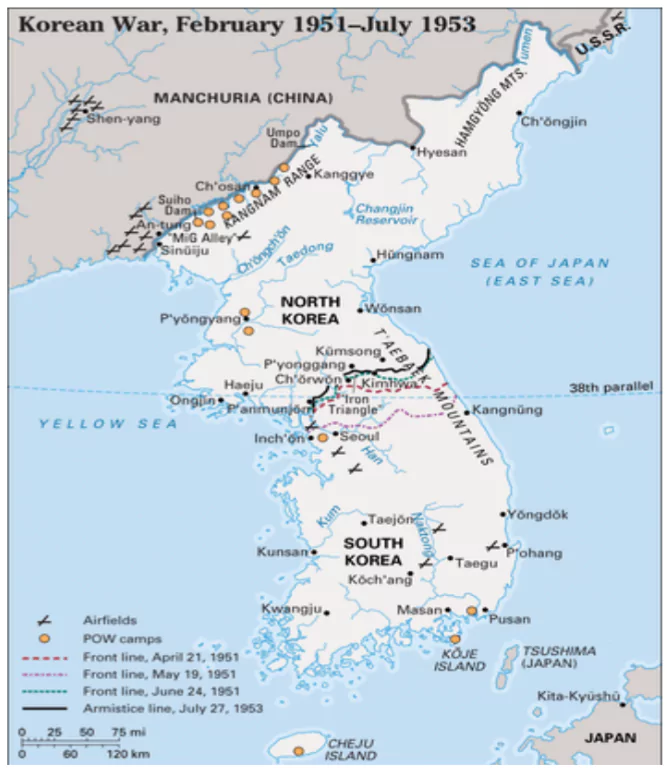The Korean War, which began on June 25, 1950, was a pivotal event in 20th-century history, as it shaped the geopolitical landscape of East Asia and impacted global affairs

- War has never formally ended: It is also called the “Forgotten War” sometimes.
- It concluded with an armistice agreement on July 27, 1953, rather than a peace treaty, leaving North and South Korea technically still at war.
History Of Rulers In Korea
Several dynasties ruled Korea before that with some uniting the entire region:
- Silla dynasty in the 7th century
- Korea then came under Japanese colonial rule from 1910 to 1945
- It ended with Japan’s surrender in WW2.
- Division: However, Korea’s liberation was quickly followed by division.
- Allied forces (comprising the US, the USSR, the UK, France, and others) agreed to a temporary division of Korea into two occupation zones:
- The Soviet Union-controlled one in the north
- The US one in the south.
Enroll now for UPSC Online Course
Post WW2
- In the North: Soviet Union helped establish a communist regime led by Kim Il-sung, a former guerrilla fighter and Soviet-trained leader.
- In the South: The United States supported the creation of a capitalist state under Syngman Rhee, an anti-communist leader who had spent many years in exile in the United States.
- 38th parallel : US authorities decided the 38th parallel would be the dividing line.
- By 1948: Two separate governments were officially established:
- Democratic People’s Republic of Korea (North Korea)
- Republic of Korea (South Korea)
- Both claimed legitimacy over the entire peninsula.
CAUSES OF THE KOREAN WAR
- Division of Korea: The post-WWII division of Korea fostered regional instability, with the USSR backing the North and the US supporting the South.
- Ideological Differences: The stark contrast between North Korea’s communism and South Korea’s capitalism ignited regional tensions.
- Geopolitical Interests: The strategic significance of the Korean Peninsula in East Asia stirred a desire for regional dominance among global powers.
- Proxy War: The war acted as a stage for the larger Cold War drama, reflecting the ideological combat between the US and USSR.
EVENTS OF THE KOREAN WAR
- North Korean Invasion (1950): A Soviet-endorsed invasion by North Korea aimed at unifying the peninsula under a single communist government.
- United Nations Intervention: A multinational force, led by the US under the United Nations banner, supported South Korea.
- Chinese Intervention (1950): China’s entry escalated the conflict and resulted in a protracted stalemate.
- Armistice Agreement (1953): The war concluded with an armistice that set a demilitarized zone along the 38th parallel; however, no formal peace treaty was established.
Legacy of the Korean War
- Permanency Of The Division: : Over time, the Cold War rivalry and the influence of the occupying powers made the division permanent.
- Today, a buffer zone called the demilitarised zone (DMZ) runs along the 38th parallel to avoid border skirmishes.
- Stalemate: The war’s stalemate solidified the 38th parallel divide, sustaining a fraught status quo on the Korean Peninsula.
- Regional Security: It has had far-reaching implications for regional security, contributing to the militarisation of the Korean Peninsula and ongoing tensions between the two Koreas and between North Korea and the West.
- Cold War Dynamics: The conflict underscored Cold War tensions, particularly between the US and China, and amplified the regional arms race.
- Solidified The Alliance Between The United States And South Korea: US established a lasting military presence in South Korea by stationing American troops and remains committed to defending it against any external aggression.
- Economic Development: It also provided economic support that has been a cornerstone of South Korea’s economic development.
- China’s Entry: China’s entry into the war demonstrated its commitment to supporting communist regimes and a willingness to confront US-led forces in the region.
- China being a key economic and diplomatic ally of North Korea.
- China’s support for North Korea in the UN and its role in providing economic assistance despite international sanctions highlights the enduring nature of their relationship.
Check Out UPSC CSE Books From PW Store
What is the role of India in the Korean War?
- Diplomacy: India was actively involved in negotiating peace in the Korean peninsula by engaging all the major stakeholders – US, USSR and China.
- In 1952: Indian resolution on Korea was adopted at the UN with unanimous non-Soviet support.
- In 1953: India rightly recognized any deal without the Soviets would fail and immediately flung into action to get them on board
- India succeeded in building consensus – which precipitated the “Armistice Agreement”
- Neutral Nations Repatriation Commission(NNRC): One of the follow-up actions to the Armistice Agreement was the establishment of a Neutral Nations Repatriation Commission (NNRC).
- NNRC was to decide on the fate of over 20,000 prisoners of war from both sides
- India was chosen as the Chair of the NNRC.
- NNRC’s tenure ended in early 1954, and the Indian forces were praised internationally for executing the tough stabilizing operations successfully.
- Asylum to prisoners of war: At the end of its work, the NNRC was left with over 80 prisoners of war who didn’t want to go to either of the Koreas.
- India also sent the 60th Parachute Field Ambulance, which did outstanding work treating more than 200,000 people between 1950 and 1954.
![]() 1 Jul 2024
1 Jul 2024
